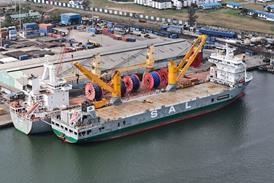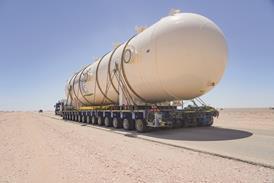With the US Department of Justice providing incentives for companies to voluntarily disclose any corruption they uncover, there is a stronger reason for companies to self-police, explains Robert Clark of TRACE International in HLPFI's July/August edition.
The year 2016 was a big 12 months for the agencies enforcing the US Foreign Corrupt Practices Act (FCPA). Between the two of them, the Department of Justice (DOJ) and the Securities and Exchange Commission concluded a record number of actions addressing violations of the world’s oldest transnational-bribery law.
The year also saw a major shift in the DOJ’s enforcement policy, with the criminal division rolling out a one-year pilot programme incentivising companies to voluntarily disclose infractions and placing greater emphasis on prosecuting the individuals who carried them out.
As 2017 approached, many wondered what would become of the agencies’ anti-corruption priorities. The previous year’s upswing could be understood as reflecting this uncertainty, with the parties wanting to finalise proceedings under stable conditions. As it happened, the number of FCPA enforcement actions – while not coming close to the 2016 record – returned more or less to normal, with a total of 14 matters resolved.
The US government’s ongoing commitment to fighting corruption was highlighted in an end-of-year speech by the deputy attorney general, Rod Rosenstein. “The FCPA is the law of the land. We will enforce it against both foreign and domestic companies that avail themselves of the privileges of the American marketplace.”
While brandishing that stick, Rosenstein also held out a carrot: the pilot programme would find continued life in a revised FCPA Corporate Enforcement Policy. When a company promptly discloses a violation, fully cooperates in any investigation, and undertakes appropriate remedial measures, the department will presumptively (barring aggravating circumstances) decline to bring charges against the company.
Cooperation, of course, includes providing information about the individuals responsible for the violation. Those individuals will find no comfort in the new policy, which is aimed directly at facilitating their identification and prosecution. As Rosenstein observed: “Effective deterrence of corporate corruption requires prosecution of culpable individuals.”
To that end, the policy also clarifies the essential elements of a corporate anti-bribery compliance programme, ranging from adequacy of resources and pathways of communication to building and maintaining a “culture of compliance”.
Effective deterrence of corporate corruption requires prosecution of culpable individuals.
- Rod Rosenstein, US deputy attorney general
Partners in compliance
By promoting the adoption of effective compliance procedures and giving companies a reason to disclose any misconduct those procedures unearth, the department makes partners of the companies in its efforts to detect and prevent corrupt behaviour.
What does this mean for companies in the logistics and freight industry? For those that are subject to US jurisdiction, there is now a greater incentive to engage in self-policing by strengthening and monitoring the critical points at which corruption can take hold. Where the work entails frequent interaction with Customs agencies, for example, clear training and consistent expectations can help employees and agents confidently resist pressure to pay for “expedited” clearance.
Customs are likely to be less of a bribery flashpoint for heavy lift projects, with a limited set of border crossings and more eyes on any given transaction. That does not mean compliance efforts become less important, but that they can be concentrated elsewhere.
Sustained oversight
Bribery demands can arise at any point in the logistics chain, from permit applications and in-country transit all the way up to high-level contract acquisition. These payments can take many forms, from simple cash handovers to complex kickback schemes involving fraudulent invoices and transfers through offshore shell corporations. Sustained oversight is crucial, with sensitivity to financial irregularities and suspicious circumstances.
Particularly when their business crosses borders, transport companies need to be aware of the multiple laws and jurisdictions to which their activities may be subject.
While the USA took the lead 40 years ago in prohibiting foreign official bribery, many other countries have since embraced the agenda. From Germany and France to Canada and Peru, a combination of international conventions and domestic popular pressure has led to an ongoing proliferation of anti-corruption legislation. And these laws are being enforced: the past year saw a record number of transnational bribery investigations worldwide, and countries in which bribery occurs are stepping up their own deterrence measures to demonstrate their hospitability to clean business practices.
Different approaches
These jurisdictions may bring different approaches to their enforcement activities. While we have seen some of them adopt practices (like deferred prosecution agreements) that favour proactive disclosure and cooperation by offending companies, there is no guarantee that leniency will always be forthcoming.
It is important to make sure that your compliance efforts are not unduly driven by the enforcement priorities of any given jurisdiction. Not only can those priorities change, but they will not be universally shared.
Overall, this may be a good thing. A robust anti-bribery programme – including a business culture oriented toward compliance – cannot be created overnight, and it is not easily turned from one direction to another to suit the changing winds. Whatever their industry, companies and the individuals working for them need to internalise the ideals of the anti-corruption agenda, with a commitment to promoting a transnational business environment with fair competition and reliable governance. This internalisation – a key aim of the new DOJ enforcement policy – will help companies stay on track ethically no matter where their business takes them.
The content of this article, taken from HLPFI's July/August 2018 edition, is intended to provide a general guide to the subject matter. Specialist advice should be sought about your specific circumstances.
Robert Clark is the manager of legal research at TRACE International, where he oversees a team of lawyers responsible for the production of analytical content, including TRACE’s annual Global Enforcement Report. He is the co-editor of What You Should Know About Anti-Bribery Compliance.
















